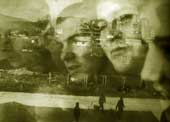 |
| Rich tradition: Matthew Barley (left), Amaan Ali Bangash and Ayaan Ali Bangash at the programme |
An unusual trio comprising young sarod players Amaan Ali Bangash and Ayaan Ali Bangash and the Australian cello player Matthew Barley enlivened an evening of music organised on the occasion of the presentation of the Hafiz Ali Khan Award for the year 2003 at G.D. Birla Sabhagar on December 22. The recipients were veteran classical vocalist Pandit A. Kanan and kathak maestro Pandit Birju Maharaj. Hafiz Ali Khan’s son and successor sarod maestro Ustad Amjad Ali Khan presented the awards: a silver salver and a citation on behalf of Ustad Hafiz Ali Khan Music Trust. Desh, the prestigious Bengali magazine, presented the programme.
It is the personage or institution an award commemorates that matters. It is a real honour for any musician to receive an award given in the name of Ustad Hafiz Ali Khan who is eponymous with the true values of North Indian classical music of yore. For people like Pandit Birju Maharaj whose family was in close proximity with that of Ustad Hafiz Ali Khan in the durbar of the Nawab of Rampore and then again at the Bharatiya Kala Kendra in New Delhi, it was an occasion for nostalgia as well. He recalled the noble appearance of the ustad and said he could clearly see him in his mind’s eye even today. He recalled that he used to accompany the teenaged Amjad Ali Khan on the tabla at the Kendra under the watchful and somewhat bemused eyes of Hafiz Ali Khan Sahab.
With the award already given to most senior artistes of the nation and even some abroad, there could not be two artistes who deserved the 2003 award more than Pandit A. Kanan and Birju Maharaj.
What could be more fitting tribute to the ustad in whose name the award has been instituted than a recital over two hours long on the occasion by his grandsons? And this was no ordinary recital. The skills of the Bangash brothers are well known but this time they were doing something extraordinary: playing with a young western classical cello maestro. And playing, one ought to add, without any tabla accompaniment. With audiences usually seeming to respond more to loud and long stretches of tabla playing rather than the main music, the Bangash-Barley venture could be called definitely daring. But the audience seemed to like it and the house was full till the end.
The recital loosely followed the alap, jod, drut gatkari and ati drut gatkari format of contemporary sarod style. The chosen raga was Kirwani, the scale of which corresponds to the western harmonic minor scale in any given key. With good time-sharing, coordination and cooperation, Bangash brothers and Barley cooked up a musical fare that kept a listener engrossed for an hour and 53 minutes without a dull moment. The skill of Matthew Barley in his own sphere is internationally acknowledged, but the way he followed Bangash leads and gave them leads to follow when his turn came, could be the envy of any Indian violinist, more so because he plays the cello which is a much more difficult instrument. His individual movements had phrases associated with some well-known compositions in the harmonic minor scale: like the popular song Autmn Leaves made famous by the late Nat King Cole and later the subject of many jazz improvisations. The deep baritone and bass tones of the cello seemed to blend well with those of the twin sarods and the instruments appeared to be well matched.
There was irony when one of the Bangashes, overreaching his abilities, played a run to the high octave out of tune and Barely, imitating, reproduced it exactly. There was a touch of the perplexing as well when the Bangashes repeatedly used a major phrase of the contemporary version of the raga Pilu (or Pilu dhun as it actually ought to be called) as sort of a leit motif. Though originally a South Indian raga, Kirwani has a movement and characteristic phrases of its own in North India now. And the Pilu phrase in question does not figure in it. Barley, however, generally avoided it just as the Bangashes avoided his western style note patterns. The five-minute aochar in Durga was fairly nice to listen to but the six-minute gatkari and especially the brief ati drut teental portion seemed a little slap-dash. Throughout the recital, the Bangashes showed exceptional skill in playing traditional material such as meend, gamak, bolkari, taankari and jhala and untraditional material such as passages made to sound somewhat like that of the rabab and improvised chords of sorts.
During what are called the sawal-jawab sessions (in North Indian classical terminology) the Bagashes appeared to choose material that would be difficult to play on the cello. For instance, one of them would stop the tone to produce a rabab-like effect while playing bolkari. This would mean that Barley would have to shelve the bow and pluck fast with his finger: a thing not a part of cello tehnique. But Barley managed magnificently: a real Australian!










